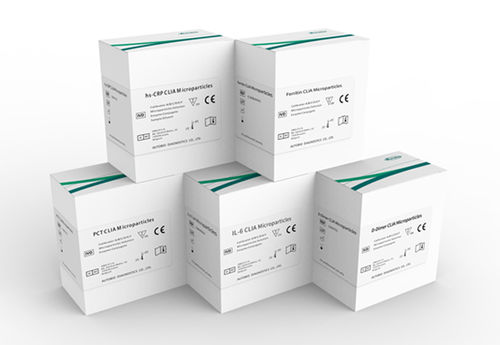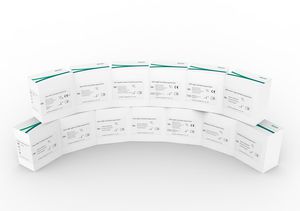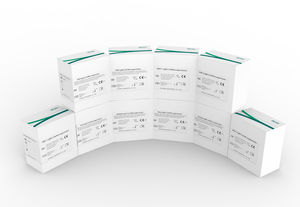
- Laboratory
- Laboratory medicine
- Pneumonia test kit
- Autobio Diagnostics

- Company
- Products
- Catalogs
- News & Trends
- Exhibitions
Inflammatory disease test kit CMR0202sepsisheart failureCOVID-19
Add to favorites
Compare this product
Characteristics
- Applications
- sepsis, heart failure, for inflammatory diseases, COVID-19, pneumonia, for infectious diseases
- Tested parameter
- CRP, hs-CRP, for IL-6, PCT, sodium, calcium
- Micro-organism
- SARS-COV-2
- Sample type
- clinical, blood, serum, plasma
- Sample volume
0.025 ml, 0.05 ml
(0.00085 US fl oz, 0.00169 US fl oz)
Description
Inflammatory markers are commonly used in clinic to diagnose and monitor inflammatory conditions, including C-reactive protein (CRP), PCT, IL6, etc. Besides, these inflammatory markers are often used in the fields of atherosclerosis, heart failure, rheumatoid, chronic obstructive pneumonia, tumor prognosis and so on. Clinicians often detect multiple inflammatory markers at the same time, which is of great help to improve the accuracy of disease diagnosis.
Clinical Significance
Quantitative determination of hs-CRP (high-sensitivity C-Reactive Protein) in human serum and plasma (EDTA, heparin or sodium citrate)
CRP is an annular (ring-shaped), pentameric protein found in blood plasma, whose levels rise in response to inflammation. CRP was elevated in 60.7% of COVID-19 patients.
Quantitative determination of PCT (Procalcitonin) in human serum and plasma (heparin, EDTA)
Procalcitonin (PCT) is a precursor of the hormone calcitonin, which is involved with calcium homeostasis, and is produced by the C-cells of the thyroid gland. The level of procalcitonin rises in a response to a proinflammatory stimulus, especially of severe infections. Increased procalcitonin values were associated with a nearly 5-fold higher risk of severe infection.
Quantitative determination of Interleukin-6 (IL-6) in human serum and plasma (EDTA) IL-6 is a pleiotropic cytokine with central roles in immune regulation, inflammation, hematopoiesis, and oncogenesis. Elevated levels of IL-6 are significantly associated with sepsis, septic shock and cytokine storm which are severe complications of SARS-CoV-2 infection.
Catalogs
No catalogs are available for this product.
See all of Autobio Diagnostics‘s catalogsExhibitions
Meet this supplier at the following exhibition(s):

Related Searches
- Autobio Diagnostics test kit
- Solution reagent kit
- Autobio Diagnostics blood test kit
- Autobio Diagnostics serum test kit
- Plasma assay kit
- Infectious disease detection kit
- Diagnostic reagent kit
- Respiratory infection test kit
- Autobio Diagnostics clinical test kit
- COVID-19 detection kit
- Clinical chemistry analyzer
- Bacteria reagent kit
- Antigen assay kit
- Clinical reagent kit
- IgG test kit
- Automatic clinical chemistry analyzer
- Benchtop clinical chemistry analyzer
- Laboratory detection kit
- Autobio Diagnostics cell test kit
- Microbiology reagent kit
*Prices are pre-tax. They exclude delivery charges and customs duties and do not include additional charges for installation or activation options. Prices are indicative only and may vary by country, with changes to the cost of raw materials and exchange rates.


